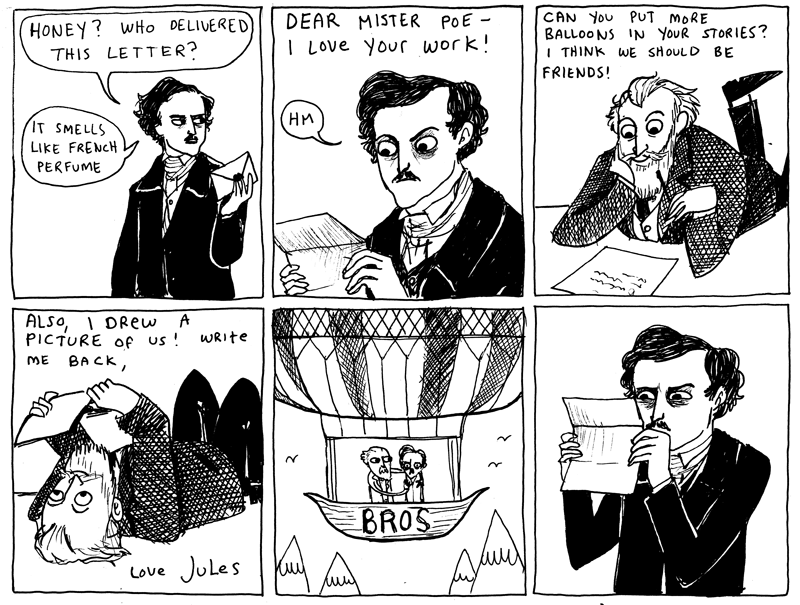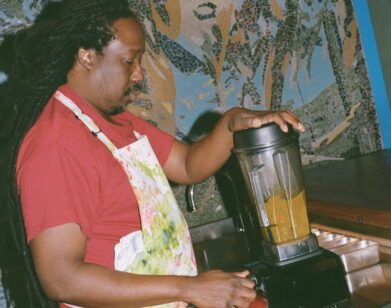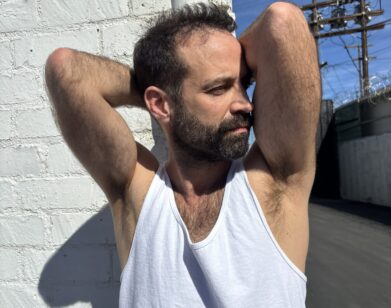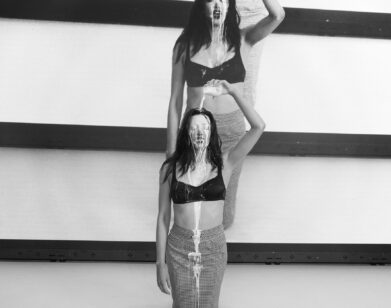Kate Beaton, History Girl

KATE BEATON. PHOTO COURTESY OF SAM JAVANROUH/TORONTO COMIC ARTS FESTIVAL
Kate Beaton is living proof that it is, in fact, possible to do something with an undergraduate history degree. Beaton is the creator of “Hark! A Vagrant,” an irreverent web comic that has skewered everyone from Jane Austen to the Zhou Dynasty. Her loose, free style and cheeky, occasionally vulgar sense of humor—Johannes Kepler: “What if the earth orbits the sun?” Tycho Brahe: “What if your wife orbits my dick?”—has won her legions of fans, as well as publication in outlets like The New Yorker and Harper’s.
Yesterday, an eponymous collection of Beaton’s comics was released by Drawn & Quarterly. To mark the occasion, we caught up with Beaton over the phone. She spoke with us from her parents’ house in Nova Scotia as her sister slept on the couch in the next room.
HILLARY BUSIS: I told one of my friends that I was going to be interviewing you, and he told me that you’re his biggest celebrity crush.
KATE BEATON: Ah, that’s hilarious! [laughs] Excellent. Is he rich and hot? I’m in.
BUSIS: Well, he’s a grad student.
BEATON: Oh man. I’m on it. I’m going to heat up some coffee. You’re going to hear the microwave go off. In my parents’ house, the coffee never stops.
COURTESY OF KATE BEATON
BUSIS: You picked a good time to not be in New York—we’ve been having a lot of natural disasters lately.
BEATON: Yeah, you have! Also it’s hot and gross there, and I’m… Canada. Hockey sticks. I don’t know. [laughs] I can’t handle it very well. I walk outside in the New York heat and I melt like the witch in The Wizard of Oz.
BUSIS: I wanted to ask you about Canada. A lot of Americans are surprised to find that many of the comedians they really love are Canadian.
BEATON: Yeah. We know it because every time there is someone who kind of becomes famous in the States, it’s on the news: “Canadian does well.” “Canadian has a job.” We’re all super aware of who’s Canadian over there.
BUSIS: Do you think that there’s something about Canadians that makes you guys funny?
BEATON: That comes up a lot when there’s articles about Canadian comedians in the states. No one’s like, “Christopher Plummer, he’s an amazing actor, is there something in the water?” [laughs] But I think that there is a certain kind of sense of humor up here. It’s sort of British and sort of American. I think in general maybe Canada had this self-deprecating deal before that was really cool. We’re not America, and we’re not Britain, and we just have to make jokes.
BUSIS: Have your comics changed since you moved?
BEATON: I don’t know. I moved to the States and started doing the extra work for the book, so instead of being like, “Let’s sit back and ease into some American stuff,” I was like, “Let’s get this done. Oh my God, I’ve got so much work to do.” [laughs]
BUSIS: That sounds American.
BEATON: It has less to do with America and more to do with my schedule. That said, I started going to going to comedy shows and stuff in New York when I was there, and that makes a big difference, seeing people. I started to do comic shows when I was there, reading comics.
BUSIS: So how does reading comics work? Do you describe what’s going on in each panel?
BEATON: They’re projected. I control the projector and you do it panel by panel so that the audience never gets ahead. You do voices and the right pauses and timing. You’re the one who made it, so you know exactly how it should be done. That’s pretty cool. And having an audience there—last night I updated the website at 2 am or something, in my parents’ kitchen, and I put on Twitter, “I updated it.” And you get back “LOL,” and you don’t know where those are coming from—they’re real people, but they’re not in front of you. So to have people actually in front of you is really amazing.
BUSIS: Do you think that you’d ever want to try animation?
BEATON: Animation is so much work! I don’t know if I have the skills to really hack that. Maybe as storyboard artist or something like that. But you have to go to school to be an animator. I can’t just pop behind the animator’s table and be like, “Here I am.”
BUSIS: I guess you’ve gone through a lot of school already.
BEATON: Yeah, and school is something that appeals to me, but then I graduated and I had this huge loan that I paid off, and I was like, “I don’t want any more loans.” [laughs] Because of course my history degree just opened all kinds of doors.
BUSIS: But actually, it did! Your story is kind of inspirational for the humanities students of the world. You also had a lot of experience working in museums—how did that influence your comics?
BEATON: I started the website while I was working at the Maritime Museum of British Columbia in Victoria, BC. Working in a museum, you get to know the local characters very well, and then you’re surprised that no one else knows who they are. The big person in Victoria at that museum was the first Justice of the Peace of British Columbia, Judge Begbie, who we knew everything about—and if you mention his name anywhere else, no one knows anything.
BUSIS: It sounds like you have a soft spot for the lesser-known historical figures.
BEATON: Yeah, but they’re always known to somebody. Obscure is a relative term. It’s cool when you can take somebody that is somebody’s number one and put it out there. Because people take the history really personally. I made a comic about Rosalind Franklin [who helped discover DNA’s double helix structure]. After that, people were like, “Please make a comic about this other lady scientist; all of her work was stolen and everyone was a dick and no one gave her credit. She’s amazing and I just wish people knew.”
BUSIS: Rosalind Franklin’s story is so unbelievable to a 21st-century person.
BEATON: Yeah. I did a comic about Mary Seacole and Florence Nightingale. [Seacole] was a black lady, and she wanted to be a nurse. And she was extremely capable but everyone was like, “I’m sorry, you’re black, that’s a problem.” Even Florence Nightingale, who is this hero, the “lady of the lamp,” was a total ass to her. It’s usually that. It’s usually somebody who was a woman, or a different ethnicity, in the wrong place at the wrong time, who was amazing and somebody was like, “I’m sorry but only huge, bearded white dudes allowed.”
BUSIS: On a different note, are there any historical or literary figures that you don’t want to write about?
BEATON: Yeah. It’s the same kind of thing-sometimes their lives were just so hard, their deal was so shitty, that you’re like, “I really want to make the comic, but I have to make it funny and this is so sad.” [laughs] I wanted to make a comic about Zora Neale Hurston. I started reading about her life—things just never seemed to go her way. She was a cool lady, she was super flamboyant, and I thought that I could find an angle, but I never did. That can be really hard—or somebody who you kind of want to make a comic about but they’re controversial. I hesitated about the Andrew Jackson one. I bring him up because he’s a classic split-the-crowd type dude—some people are like, “He was amazing!” and some people are like, “He was the devil.”
Even stuff like Napoleon—I make all these Napoleon jokes. And I make him kind of cute and little, but Napoleon was a monster. [laughs] He was terrible. But it’s so easy to take those big, blustery dudes that tower and kind of knock them down to size.
BUSIS: With Napoleon, there’s not very far to go.
BEATON: Actually, that’s not true! He was fairly tall. There was a French system of height that was different from English. So when a French person is five feet, it’s actually six feet or something.
BUSIS: Well, thank you for teaching all of our readers something new.
BEATON: [laughs] Yeah, I think that’s what it was. He was actually average height, but the French measurement was different from the English one. There are some figures where you walk a fine line. You can’t make fun of them without acknowledging some awful thing that they did—you have to put that in. And it’s really easy to offend people, and I’ve done that before inadvertently.
BUSIS: Like when?
BEATON: Once I made a comic about—okay, this is complicated [laughs]—about Quebec, this governor [named] Frontenac. First of all, it was convoluted. The joke was super confusing, and most people who read it have no idea what Quebec history is like, who Governor Frontenac is or who Jacques Parizeau is.
BUSIS: Maybe they were offended because they didn’t get the joke. Besides being more aware of that, how has your style evolved since you published your first book?
BEATON: I can draw better. I didn’t draw for, honestly, a couple of years and I kind of forgot how. When I started doing comics again I had to re-learn. And I learned how to be funnier, what kind of jokes I wanted to tell. But you’re always doing stuff that’s different; when I started I usually had longer form comics, and then I stopped that because I found the pressure really high to nail it every time. It’s really difficult to be creative all the time.
BUSIS: Do you ever wish that you could go back to a time where you were less well known?
BEATON: Yeah. My job never actually leaves me. I watch people who come home from work at six and they’re done, and that seems crazy. Then again, they have to get up at seven and go to work, to a job that maybe they don’t really care about, and I get to do something that I care about. It’s the same old complaint and struggle that everybody who does this sort of thing goes through. Because you’re carrying the whole thing by yourself. You have an audience there that’s like, looking at their watch [laughs] and you’re like, “I don’t have anything today.” I can get in bad ruts where no ideas seem to work for days and you’re just sitting there banging your head on the wall. Then when it works and you’re finished, it’s amazing. [laughs] So just a big rollercoaster of things, thoughts, feelings, relationships…
BUSIS: Words…
BEATON: Yes. I’ll have to get my thesaurus out.
BUSIS: It does also seem like you are branching out more into writing comics that aren’t necessarily literary or historical.
BEATON: Yeah, I always kind of did that. There was a while, maybe in 2009, when I was only really making history comics, and I burnt out on it. I pick a topic that maybe I’m unfamiliar with-because if I only did comics that I’m familiar with, all you’re getting is prime ministers. And you do all of this research. When I did a comic about Chopin and Liszt, I didn’t know anything about them. I read for four days about them, before I made those comics. And they end up being—half of them are fart jokes, but you have to become very familiar with the topic before you can make fun of it. You have to be as familiar as the person who likes it the best, who has Chopin: The Intense Autobiography. They have to like it too; they’ll know when you’re phoning it in.
BUSIS: You have to avoid obvious jokes.
BEATON: Yeah. I enjoy that challenge. But it’s also exhausting. So sometimes I just can’t do all that and I make a joke about ’80s business ladies with huge shoulders.
HARK! A VAGRANT IS OUT NOW. TO SEE KATE BEATON’S COMICS, VISIT HER WEBSITE.






